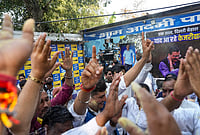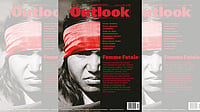Ebullient, charming and compassionate, he was a prototype of what the Raj threw up in droves in the early part of the century: the Edwardian eccentric and amateur whose daft ideas leavened by learning and humour prevented him from becoming a crank and allowed for a fertile association with his adopted country. Many of India's public schools and smaller civil institutions were begun by men like that, and may stand in for all of them, as their icon and Patron Saint.
All this (and more) Ram Guha has documented with verve and affection. Elwin lived a life which produced a sheaf of unexpected moves; it was impossible to tell where he'd be, and doing what, from one day to the next; if his own autobiography— produced posthumously— smoothens the rough junctures of those choiceriddled and anxious times, Guha re- wrinkles the fabric again; and the humanised Elwin emerges more complex, more heroic for that. As biography this is almost an object lesson ina scrupulous (and opinionated) respect. That the Nehruvian Guha admires Elwin truculently, there's no doubt; that this doesn't produce a hagiography is praiseworthy; and that this esteem for Elwin allows him to assault Elwin's detractors (primarily oppositional anthropologists and post- colonial academics who hold by the silly arithmetic that white man= bad man) is unfortunate but perhaps necessary.
The biographical virtues are abundant; chief among them the delightful episodes where Guha's seach for material prodeuces some insight into Elwin's life (for instance: he's still disowned by his former school as a black sheep: an evangelist turned tribal Buddhist). Elwin lived an almost stereo- typed life for the first 20 years: Public sch ool- Oxford- evangelism- India- Gandhism. Reading the early part of his career is like watching a well- oiled machine function flawlessly. It was his association with tribals— upon which he stumbled under the advice of Bajaj— that the normalcy of this Raj life comes unravelled in a flamboyant fashion. It's a difficult stage in the book, and Guha bridges it ably. That a biography must skirt the thin line between anecdote and history Guha knows and manages with great assurance and some humour; and if his narrative flags, as it does once or twice through the otherwise extraordinary tale, it may be because Elwin's own life seems at that point to have entered a swamp of dullness. If the book has blemishes, they mostly stylistic: Guha a fondness for theare gratuitous adjective; hehas lapses— unexpectedly and undesirably— into teenage slang (" Byron hung out with sons of PMs..."); and his chapter capped by the silly- clever titleheadings, of the book (witty or execrable depending on your point of view) smell of undergraduate precocity. More seriously, we're not given a basic bibliography of Elwin's work— the more telling since OUP was his publisher for much of his output— despite an able analysis of many of them, and an even more able summation of his life's oeuvre in the epilogue.
It takes a minor poet to translate a major poet well; likewise, it takes a minor eccentric to translate a major eccentric well. Ram Guha has spent— under Elwin's posthumous tutelage, he tells us disarmingly— much of his life in ways that have unbound his own training; and he's used this unravelling to understand, with some sympathy and great affection, the unravelling of the other. Biography, Johnson wrote in 1759, wishes either to exalt the praise of its subject or aggravate its infamy. This is beyond doubt an exaltation, and a joyful one at that; and one that endears the reader both to the subject to be biographer.


























